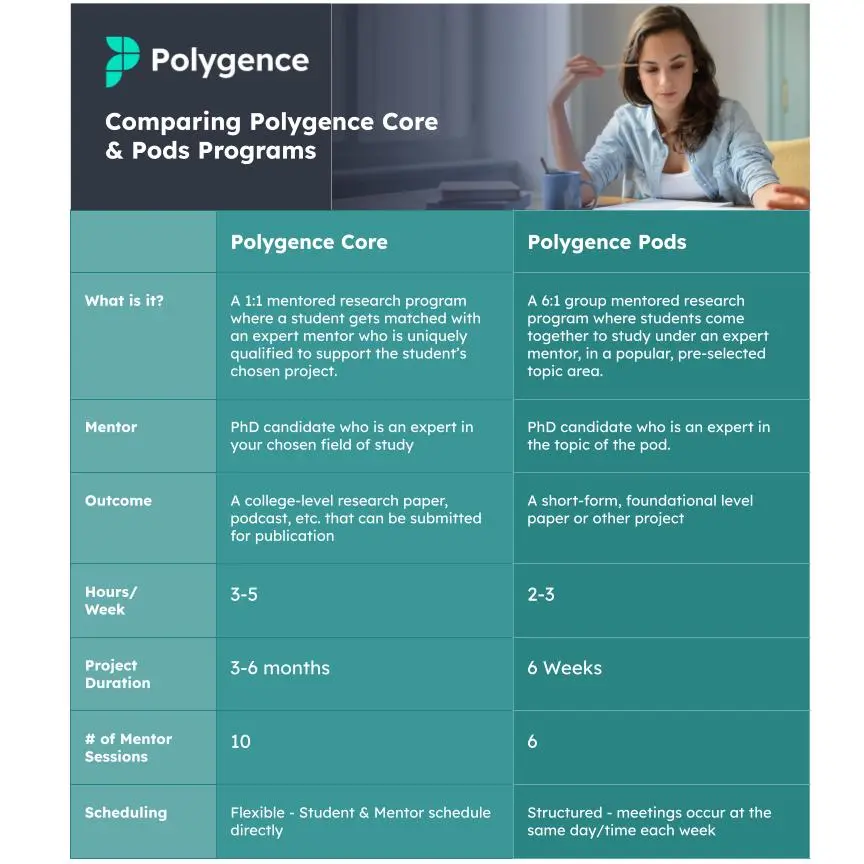10 Artificial Intelligence (AI) Project Ideas for High School Students
8 minute read
In recent years, the rise of artificial intelligence (AI) has been nothing short of astronomic, revolutionizing industries and shaping the way we live and work.
Both students and professionals have witnessed the power of AI, especially with tools like ChatGPT, which can produce code, content, and insights. AI's applications are diverse, ranging from enhancing medical diagnoses and improving customer experiences through chatbots to optimizing supply chains and bolstering cybersecurity. As AI continues to evolve, its societal and ethical implications become increasingly important as well, underscoring the need for future generations of students to become familiar with using AI and understand its capabilities.
An experienced AI mentor from Polygence can help you develop your AI passion project, empowering you and other scholars to better understand the future implications of AI technology. Our mentors are industry experts and tech researchers from the nation’s top institutions. They know the technology inside and out and share your excitement for AI’s possibilities. Why not join the next cohort of Polygence scholars exploring artificial intelligence through our Pods program?
Do your own research through Polygence!
Polygence pairs you with an expert mentor in your area of passion. Together, you work to create a high quality research project that is uniquely your own.
What are some AI project ideas that high schoolers can start?
1. Value of social media for stock investing
Financial investing has evolved considerably in the last decade. Single tweets can cause a stock to nosedive 10% in one day of trading. Can we harness these conversations on social media for stock investing? What kinds of language or words can affect stock prices? This project would involve hooking up APIs from social media platforms like Twitter and processing them with NLP algorithms.
Idea by AI research mentor Anthony
2. Sentiment analysis of COVID-19 vaccine tweets
Apply data mining and API used to synthesize hundreds of thousands of tweets and perform sentiment analysis to compare which COVID-19 vaccine is most promising in different geographic regions. Compare which side effects are most predominant among Pfizer vaccine recipients versus Moderna vaccine recipients. This project could culminate in an article that takes the reader through the project from exploratory data analysis to code implementation, and finally a well-articulated discussion of research findings and limitations.
Idea by AI research mentor Sejal
3. Natural language processing and BERT
In 2018, Google released BERT, a neural language model that helped NLP practitioners outperform previous state-of-the-art benchmarks in language tasks (e.g. question answering, sentiment analysis, machine translation). In this project, learn how deep learning researchers approach problems in language quantitatively and develop an understanding of "contextual word embeddings" and the motivation for BERT. Then, apply BERT to a language task of your choosing. One example is quantifying political bias in news articles.
Idea by AI research mentor Anav
Welcome your robot overlords
Interested in Artificial Intelligence? We'll match you with an expert mentor who will help you explore your next project.
4. Application of AI to clinical diagnosis and disease classification
AI has become an important tool in the classification of diseases and conditions in clinical settings. Machine learning algorithms can be trained on large datasets of patient data to recognize patterns and predict diagnoses with a high degree of accuracy. This allows healthcare professionals to make more informed decisions and provide more personalized treatment plans for their patients. In this project, you can aim to accomplish two goals: 1) develop a machine learning based algorithm for the classification of disease based on existing patients' medical records, and 2) write a paper to summarize the results related to the machine learning algorithm.
Idea by AI research mentor Morteza
5. Homework tracker
When school gets busy, homework assignments tend to get difficult to keep track of and lists aren't always the best way to get assignments done. In this project, build a simple Python / Flask web application that serves as a dashboard to organize homework assignments. Students can create "homework assignments" and add them to a visual stack. They can click "start" for a particular homework assignment and keep track of how long it takes them to complete that assignment. This data can be stored and organized so the students can see how much time they spend on each subject.
Idea by AI research mentor Shreeya
6. Identifying bias in user-facing machine learning models
Machine learning models are ubiquitous in our digital lives, but their presence is not alway obvious. Recently, Twitter users discovered that the automatic cropping used to display preview images was biased toward white, male faces. This is an example of statistical bias arising out of our human bias; because the facial detection algorithm was trained on a dataset of predominantly white, male faces, it predicts similar faces with high confidence. This project challenges students to identify similar instances of bias in interactive digital media resulting from machine learning and AI. What’s the impact of these biases?
Idea by AI research mentor Benjamin
7. AI-generated art
Explore the world of AI-generated artwork by first learning about Generative Adversarial Networks (GANs) and understanding how they work. Then, begin to explore specific models for AI-generated art, like DeepDream and Dall-E. You can then decide between different project options, like creating a portfolio of AI-generated artworks inspired by famous artists or art movements or combining AI-generated art with traditional artistic techniques, such as painting or sculpture, to create hybrid artworks.
8. AI-generated music
If you’re passionate about music, this could be a great AI project for you! Try to compose original music using AI models, experimenting with different styles and genres. Make use of tools like Magenta Studio to help you compose drum patterns and loops, and just see what you can create! If you feel comfortable, post your finished piece on social media and streaming platforms.
Going in a slightly different direction, today’s experimental music composers are using artificial intelligence tools to develop new methods, processes, and artistic aesthetics. For example, composers have used AI-generated code in live-coding performances, while others have built structured improvisations around AI-based tools’ capacities to control and perform digital synthesizers to generate new digital sound textures in response to real-time audio or MIDI input. Also, did you know that AI chat tools can compose music in the text-based LilyPond notation syntax? If you’re interested in music and AI, be sure to check out our music research projects for high school students.
9. Build your own chatbot
Students can build their chatbots using natural language processing (NLP) models. These chatbots can be designed to answer questions, offer recommendations, or even engage in creative conversations. The purpose and personality of the chatbot is totally up to you! Building your own chatbot from scratch can seem like a daunting task, but this video tutorial should be a great way to get started on the project.
10. AI-generated movie script
Have you ever watched a movie and been captivated by the writing and dialogue? This project is your opportunity to write a movie script, but with the help of AI tools. You can start with a tool like chatGPT and prompt it to give you a movie script, but be sure that when you do so, you provide as many specific details as possible about the theme of the movie, the plot, and the characters. After chatGPT generates its response, then begin to tweak the lines and adjust them based on your vision for the script and continue prompting AI to help you in perfecting it.
Polygence Scholars Are Also Passionate About
What Skills Can You Learn Through AI Research?
Artificial intelligence requires a mix of technical, math, and field-specific skills. First off, you’ll begin to learn coding and languages like Python or R. AI and machine learning (ML) involve making complex sets of instructions (algorithms) that you can create using these languages. Working in AI also means that you’ll become well-versed in different machine learning methods, like supervised and unsupervised learning.
Additionally, you'll need to be comfortable with organizing and cleaning up data. AI and ML algorithms learn from past data sets to make predictions, so if the data is messy with duplicates, missing parts, or not diverse enough, it can mess up how well the algorithms work. So, part of AI and ML involves making sure the data you use is in good shape.
Through AI research you can also learn about Application Programming Interfaces (APIs). They play a crucial role in modern software by allowing developers to access the functionality or data of another application, service, or platform without needing to understand its internal workings. For instance, let's say you're building a website for a local restaurant. You want to display an interactive map on the restaurant's website to help customers find their location easily. Instead of creating your own mapping system from scratch, you can use the Google Maps API to embed and display the map on your product.
You can even participate in AI without full knowledge of coding and programming languages. There are plenty of generative AI tools out there now that specifically cater to users without coding experience, and allow you to create incredible content, art, music, and writing with a few clicks. Although there are no technical skills involved with using these applications, becoming an expert in how to use an application can be a valuable skill for the long term, especially in a world driven by AI.
How can I start, complete, and showcase my AI passion project?
In this article, we’ve covered the skills you can learn from doing an AI passion project and shared 10 different research and project ideas for high school students to take on. Still unsure where to begin? If you’re interested in pursuing an artificial intelligence research project under the guidance of an experienced mentor, Polygence Pods offers the ideal environment to launch and develop your AI project.
Pods provide a flexible learning space where you can work with top-tier research mentors who are well-versed in AI and computer science. You’ll also learn alongside two to five other high school students who share your passion for AI, creating a tight-knit group dynamic. Your Pod will meet weekly for one-hour video sessions, allowing you to join from any location that suits your schedule. The work you’ll do outside of these sessions allows the experience to be packed into a focused five- to six-week program.
Each session is led by your Pod’s mentor, who will guide you through lectures, discussions, and the development of your unique research outcome. Together, you’ll address pressing questions in AI, such as exploring the impact of AI on research methods in science and engineering or exploring the impact of AI on science and engineering research methods!
Once you’ve completed your Pod sessions and crafted your AI research project, it’s time to showcase your work. Many project ideas, like building a homework tracker or creating AI art, have a natural end product. But think beyond the final product and consider how to showcase your research. For example, if you’ve created AI artwork, share the inspiration and methods behind it through a vlog, blog post, or even a TikTok. This storytelling element adds depth to your project, making it more engaging for your audience.
Whatever outcome you envision for your AI passion project, it all starts with Pods — a fast-paced, flexible AI learning environment. If you’re also interested in related fields, be sure to check out our leadership, data science, and math projects for high school students.

